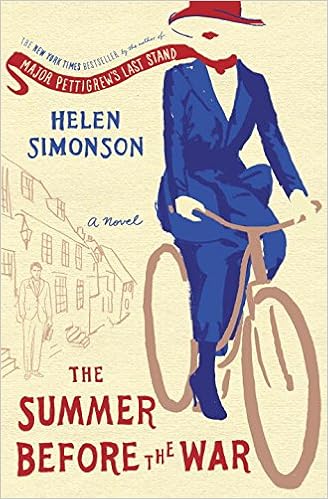In a sleepy English village in 1914, Beatrice Nash arrives to do the unprecedented: to teach Latin to the village’s students. Freethinking, attractive, and studious, her arrival uproots the villagers’ quaint notions of what a Latin teacher should be. Meanwhile, Hugh Grange is preparing to marry a surgeon’s daughter and inherit a lucrative practice. But when he is sent to pick up Beatrice from the train station, his plans suddenly don’t seem so concrete. While the town wars between notions of progress and tradition, a greater war is brewing in Europe, threatening the summer idyll of the town.
 Helen Simonson’s The Summer Before the War brings readers to the charming Sussex town of Rye. On the surface, it’s your quintessential Edwardian English village: all sunshine, gardens, and bicycle rides into town, charming in its pre-war naivety. The novel takes its time, the pace as leisurely as life in Rye. But Simonson isn’t a nostalgic writer, and beneath the pretty surface she exposes the ugly truth of bigotry and small-town pettiness. And as the realities of World War I encroach on town life, these truths are thrown into sharper and sharper relief.
Helen Simonson’s The Summer Before the War brings readers to the charming Sussex town of Rye. On the surface, it’s your quintessential Edwardian English village: all sunshine, gardens, and bicycle rides into town, charming in its pre-war naivety. The novel takes its time, the pace as leisurely as life in Rye. But Simonson isn’t a nostalgic writer, and beneath the pretty surface she exposes the ugly truth of bigotry and small-town pettiness. And as the realities of World War I encroach on town life, these truths are thrown into sharper and sharper relief.
The Summer Before the War is reminiscent of many things. Beatrice Nash might call to mind Elizabeth Bennet in her independence, progressiveness, and ability to craft a covert insult. The plot and setting will be familiar to Downton Abbey fans, which also dealt with themes of grand families, social progress, and World War I. While Jane Austen and Downton both take shots at high society’s thin veneer of gentility, Simonson’s novel digs further into the cracks. There are suffragettes and bohemians in Rye. A woman is a victim of a war crime. An aspiring poet and an earl’s son might be more than friends. These people threaten the status quo of Rye’s social core, and so they’re all but shunned—with the utmost decorum. Simonson does an excellent job portraying the frustrations and quiet outrage of Beatrice Nash as she tries to stand ground both for herself and her friends. Simonson presents more than one war: one physical, fought on the battlefield, and one ideological, fought at home.
There’s also the timely issue of refugees, as Rye becomes home to a large number of displaced Belgians (in fact, England took in 250,000 Belgian refugees over the course of WWI). The townspeople open their doors to the Belgians, but not without comment (“It is quite impossible to ask our ladies to take absolute peasants into their own houses, however charming their wooden clogs.”) or without patting themselves on the back. It’s hard to read about the plight of the Belgians without thinking of today’s refugee crisis. Are we any less judgmental? Are we any less self-congratulatory?
• • • • • • • • • • • • • • • • • • • • • • • • • •
Have any thoughts about this book? Leave a comment below! Some questions to consider are:
1. Women didn’t fight on the fields in WWI, but they had their own fight at home. What sort of injustices do Beatrice and her peers face? How did life at home change after the First World War?
2. Society in 1914 England is divided by men and women, but also by social class. For example, Snout is denied an equal education because he is Romani. In what ways did society restrict both men and women before the war? What freedoms do we have now? What freedoms are we still fighting for?
3. The Summer Before the War takes place in a time when war was still thought to be glorious, but the events of WWI start to change this notion. Do you agree with Agatha’s attempts to keep Daniel home? Or is dying for your country always honourable?


